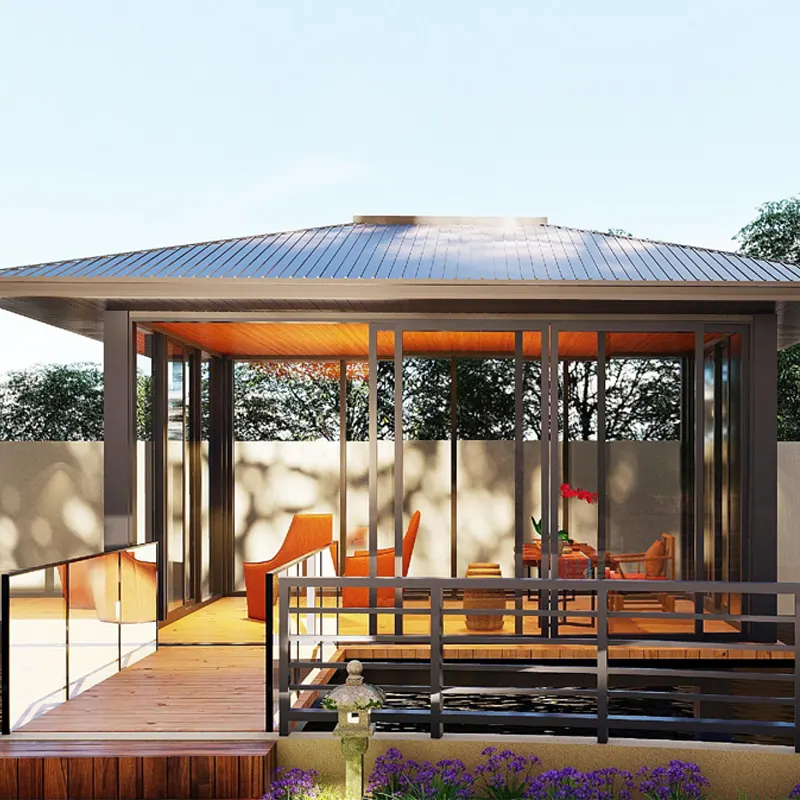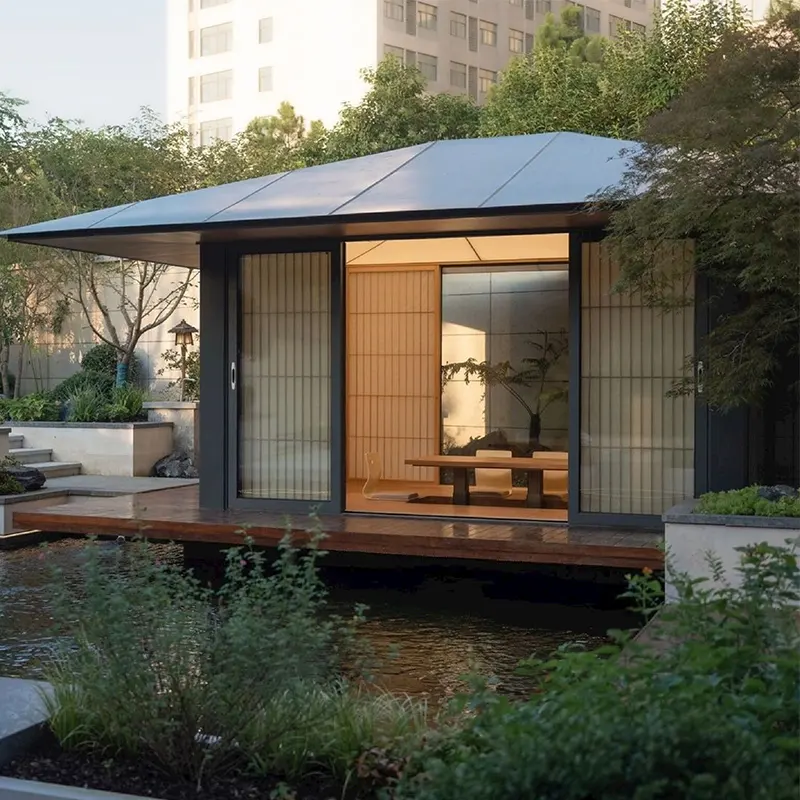Aesthetic Flexibility and Design Options
Wooden Folding Doors: Classic Charm and Custom Stains
Wooden folding doors embody a timeless charm that fits seamlessly into various architectural styles, whether rustic or contemporary. One of their appealing attributes is the ability to customize them extensively. Homeowners can select from different wood types, finishes, and custom stains to create a look that reflects their personal style. This personalization not only enhances the beauty of a home but can also increase its market value. Indeed, statistics show that properties featuring wooden elements often see an uptick in value, underlining the wisdom of investing in such classic features.
Aluminum Folding Doors: Modern Profiles and Color Variety
Aluminum folding doors are synonymous with modern aesthetics, offering sleek profiles and expansive glass panels that flood spaces with natural light. These doors are available in a plethora of powder-coated colors, providing homeowners with ample design flexibility to suit their design preferences. Insights from industry specialists highlight that aluminum doors are a popular choice for their contemporary appearance and ability to enhance a home's curb appeal. With their minimalist design and vast customization options, aluminum folding doors are perfect for those looking to make a modern architectural statement.
Accordion vs. Sliding Window Systems for Sunrooms
When it comes to maximizing space in sunrooms, accordion doors excel with their ability to stack neatly to one side, providing unmatched panoramic views. In contrast, sliding window systems offer a traditional option that is user-friendly, maintaining the flow of sunlight within the room. Research indicates that accordion doors are favored by homeowners due to their aesthetic flexibility and superior functionality in sunroom installations. The choice between accordion and sliding window systems often comes down to personal preference and the desired balance between modern appeal and traditional usability.
Durability in Coastal Climates and Humid Environments
Aluminum's Resistance to Warping and Rust
Aluminum stands out for its resistance to warping and rust, making it an excellent choice for coastal and humid environments. This metal's non-porous nature ensures it doesn't succumb to the corrosive effects of saltwater or moisture, a trait that finds parallels in its extensive use in the boat and marine industries. These industries often rely on aluminum for its durability under harsh conditions. Studies have shown that homeowners in areas with challenging climates experience significantly reduced maintenance costs with aluminum doors compared to wooden ones, which frequently require extra treatments and repairs.
Wood’s Vulnerability to Moisture and Seasonal Shifting
Wooden doors, while aesthetically pleasing, are prone to warping, swelling, and splitting in humid and variable climates. High moisture levels can cause wood to absorb water, leading to these issues, particularly during seasonal shifts. Regular maintenance for wooden doors is crucial and may include resealing and treating to mitigate such damage. Experts recommend using specially treated woods or tropical hardwoods, which offer enhanced resistance to moisture. However, even these resistant variants require consistent care to maintain their integrity and appearance over time.
Thermal Efficiency and Energy Savings
Natural Insulation Properties of Wooden Doors
Wooden doors excel in thermal insulation due to their natural properties, substantially aiding in maintaining stable indoor temperatures. A study indicates that homes with wooden doors can reduce heating and cooling costs by up to 15%, depending on the specific climate and location. This insulation capability not only translates to energy savings but also aligns with eco-friendly practices in architectural design. The aesthetic and functional qualities of wood make it a preferred choice for those focusing on sustainability and energy efficiency.
Aluminum’s Thermal Break Technology
Aluminum doors equipped with thermal break technology significantly enhance thermal efficiency by reducing heat transfer between the interior and exterior sections. This is achieved through the incorporation of non-conductive materials, which provide a barrier to heat flow. Research shows that aluminum doors with thermal breaks can deliver up to 30% more in energy savings compared to traditional wooden doors. This technology represents a vital advancement in achieving superior thermal performance, making aluminum doors a practical option for energy-conscious consumers.

Maintenance Requirements Over Time
Low-Upkeep Benefits of Aluminum Folding Doors
Aluminum folding doors are favored for their low-maintenance needs compared to wooden options, making them ideal for those with busy lifestyles. Typically, the upkeep involves periodic cleaning and occasional lubrication of hinges and locks, which is a stark contrast to the more demanding maintenance required for wood. Experts often emphasize that the longevity and low-maintenance characteristics of aluminum doors contribute to lower long-term costs. This makes aluminum a particularly cost-effective choice for homeowners who seek durability without the hassle of extensive upkeep. Given their low effort, aluminum folding doors offer substantial appeal for both residential and commercial properties seeking efficiency and style in one package.
Seasonal Maintenance Needs for Wooden Systems
Wooden folding doors require more hands-on maintenance than aluminum doors, particularly with seasonal checks to ensure longevity. Regular inspections are essential, focusing on detecting moisture damage or signs of wear that could compromise the wood. To maintain their beauty and integrity, wooden doors often need re-sealing, refinishing, or painting. Specialists suggest that despite the higher maintenance demands, properly cared-for wooden doors can last for decades, offering timeless elegance and durability. This ongoing commitment to care ensures that the natural warmth and charm of wooden doors are preserved, making them a worthy investment for those who appreciate their classic appeal.
Cost Considerations for Folding Door Installation
Upfront Pricing vs. Long-Term Value Retention
Understanding the initial and long-term cost implications of folding doors is crucial for homeowners. Aluminum doors, though potentially more costly upfront, often offer significant savings over time due to their durability and low maintenance requirements. Conversely, wooden doors might have lower initial costs; however, they could present additional expenses in maintenance and repairs. A study from real estate market experts indicates that homeowners tend to recover more of their investment with aluminum doors during resale because of their longevity and appeal.
Impact on Sunroom or Patio Renovation Budgets
When budgeting for sunroom or patio renovations, folding doors can be a significant consideration. Their design and material choices greatly affect the overall renovation costs. Homeowners must balance these initial expenses with potential benefits, such as energy savings and increased home value. Industry specialists advocate that investing wisely in high-quality folding doors can yield substantial returns when selling the property. Furthermore, folding doors enhance the aesthetic appeal and energy efficiency of spaces like sunrooms, making them a worthwhile investment in home renovations.
FAQ — Aesthetic Flexibility and Design Options of Folding Doors
What are the main differences between wooden and aluminum folding doors in terms of appearance and customization?
Wooden folding doors offer classic charm with customizable wood types, finishes, and stains, ideal for traditional or rustic styles. Aluminum folding doors provide sleek, modern profiles with a wide range of powder-coated colors, perfect for contemporary designs and maximizing natural light.
How do wooden and aluminum folding doors perform in humid or coastal environments?
Aluminum doors resist warping and rust, making them highly durable in humid or coastal climates with low maintenance needs. Wooden doors are more vulnerable to moisture damage and seasonal changes, requiring regular treatment and care to maintain their integrity.
What are the energy efficiency benefits of wooden versus aluminum folding doors?
Wooden doors naturally insulate well, helping reduce heating and cooling costs by around 15%. Aluminum doors equipped with thermal break technology offer even greater energy savings—up to 30%—by minimizing heat transfer between indoors and outdoors.
How do maintenance and long-term costs compare between wooden and aluminum folding doors?
Aluminum folding doors are low-maintenance, requiring only occasional cleaning and lubrication, which reduces long-term costs. Wooden doors demand more frequent upkeep such as resealing and refinishing but can last for decades if properly cared for, offering timeless elegance.
Table of Contents
- Aesthetic Flexibility and Design Options
- Durability in Coastal Climates and Humid Environments
- Thermal Efficiency and Energy Savings
- Maintenance Requirements Over Time
- Cost Considerations for Folding Door Installation
-
FAQ — Aesthetic Flexibility and Design Options of Folding Doors
- What are the main differences between wooden and aluminum folding doors in terms of appearance and customization?
- How do wooden and aluminum folding doors perform in humid or coastal environments?
- What are the energy efficiency benefits of wooden versus aluminum folding doors?
- How do maintenance and long-term costs compare between wooden and aluminum folding doors?

 EN
EN








































